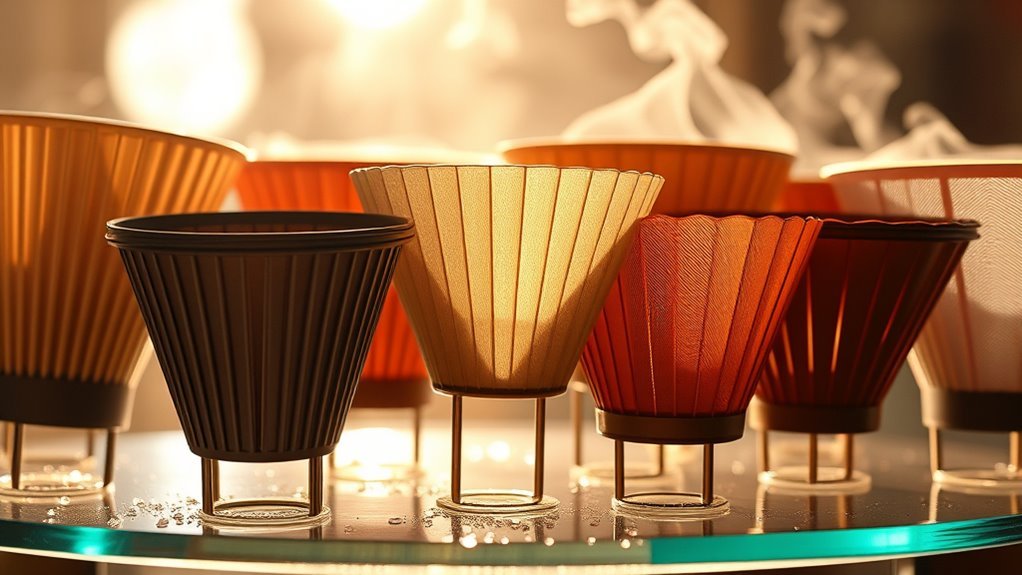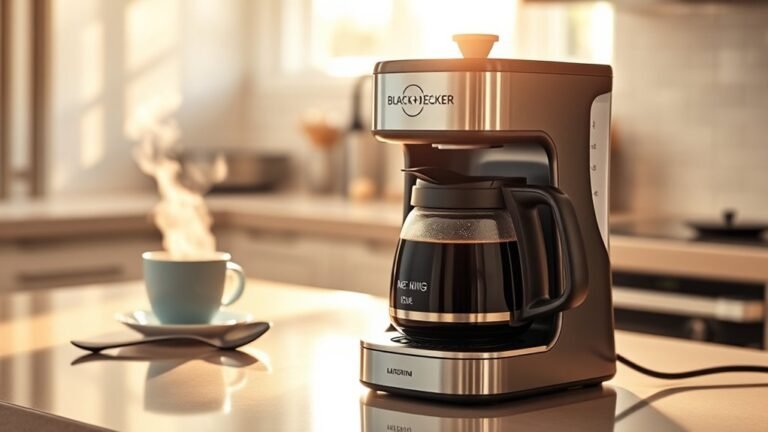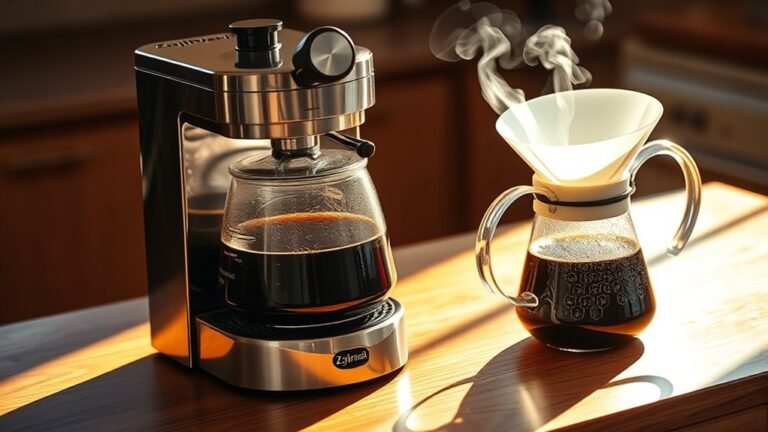Exploring Different Types of Coffee Filters
You’ll find coffee filters vary by material—paper filters trap oils for a clean cup, while metal and gold mesh let more oils through, yielding fuller body but potentially more sediment. Cloth filters balance clarity and mouthfeel but need special care. Plastic filters are durable but less eco-friendly. Reusable options reduce waste and cost, unlike disposables. Your filter choice directly affects extraction efficiency, flavor profile, and environmental impact. Understanding these nuances helps you optimize brewing precision.
Paper Coffee Filters

Paper coffee filters are essential components in drip brewing systems, designed to trap coffee grounds while allowing liquid to pass through efficiently. When selecting paper filters, you’ll notice various filter sizes tailored to specific drip machines and brewing techniques, ensuring ideal extraction and flow rate. The porous structure of these filters captures fine sediment, resulting in a clean cup with balanced flavors. Depending on your preferred brewing technique, you might choose designs with flat-bottom or cone shapes, each influencing water distribution and extraction consistency. Using the correct filter size prevents overflow or under-extraction, giving you control over brew strength and clarity. By understanding these technical distinctions, you gain freedom to fine-tune your coffee experience precisely, maximizing flavor while minimizing effort.
Metal Coffee Filters
When you use metal coffee filters, you’ll notice their exceptional durability and ability to be reused countless times without degrading. They allow more oils and fine particles to pass through compared to paper filters, which greatly affects the coffee’s flavor profile. Understanding these characteristics helps you decide if metal filters align with your brewing preferences.
Durability and Reusability
Although metal coffee filters may require a higher initial investment compared to disposable options, their durability greatly reduces long-term costs. When you choose metal filters, you’re investing in an extended filter lifespan, which minimizes waste and substantially lowers environmental impact. These filters withstand repeated use without degrading, supporting sustainable coffee routines.
Consider these durability and reusability factors:
- Constructed from corrosion-resistant stainless steel or gold-plated mesh
- Withstands high temperatures and frequent cleaning without structural damage
- Resistant to bending or tearing, unlike paper or plastic filters
- Offers consistent performance over hundreds of brewing cycles
Impact on Coffee Flavor
Beyond their durability, metal coffee filters also influence the flavor profile of your brew in distinct ways. Unlike paper filters, metal filters allow more coffee oils and fine particles to pass through, which enhances flavor richness and body. This results in a fuller mouthfeel but also elevates coffee acidity, making bright and fruity notes more pronounced. If you prefer a vibrant cup with complex acidity, metal filters deliver that freedom by preserving essential aromatic compounds typically absorbed by paper. However, because they don’t trap all sediments, your coffee may have a slightly gritty texture. Ultimately, metal filters offer a precise balance between clarity and intensity, letting you control the sensory experience of your coffee without sacrificing its nuanced flavors or natural acidity.
Cloth Coffee Filters
When you use cloth coffee filters, you’re working with tightly woven fibers that offer moderate durability but require careful handling to prevent wear. These filters influence brewing by allowing more oils through than paper filters, which enhances flavor complexity without the metallic notes of metal filters. You’ll need to follow specific cleaning routines to avoid residue buildup and maintain consistent performance over time.
Material and Durability
A cloth coffee filter typically consists of tightly woven cotton or hemp fibers designed to withstand repeated use without compromising filtration quality. When you consider filter strength, cloth filters offer impressive durability compared to paper variants, resisting tears and deformation over time. The material comparison highlights natural fibers’ resilience and eco-friendliness, though they require thorough cleaning after each use to maintain performance.
Keep these points in mind:
- Cotton filters provide excellent tensile strength and flexibility.
- Hemp fibers contribute natural antimicrobial properties.
- Proper maintenance prevents fiber breakdown and clogging.
- Durability depends on weave density and fiber quality.
Choosing cloth means embracing a sustainable, reusable option that balances robustness and fine filtration, granting you freedom from disposable waste without sacrificing reliability.
Brewing Flavor Impact
How does using a cloth coffee filter influence the flavor profile of your brew? Cloth filters uniquely balance filtration and permeability, allowing more of the coffee’s natural oils and fine particles to pass through compared to paper filters. This results in a fuller-bodied cup with enhanced mouthfeel and complexity in flavor profiles. Unlike metal filters, cloth avoids imparting metallic notes, preserving the coffee’s original aromatic nuances. When employing various brewing techniques—like pour-over or drip—you’ll notice the subtle clarity combined with richness that cloth filters provide. This combination appeals to those who seek freedom from overly muted or excessively bright brews. Ultimately, cloth filters offer a precise modulation of extraction, delivering a nuanced, clean cup that highlights your coffee’s inherent characteristics without sacrificing depth or texture.
Cleaning and Maintenance
Since cloth coffee filters retain oils and fine particles more than paper filters, you’ll need to clean them meticulously to maintain ideal filtration and flavor clarity. Proper maintenance guarantees your filter’s longevity and consistent brew quality. After each use, rinse the filter under hot water immediately to remove residual grounds. For deep cleaning, soak it weekly in a baking soda solution to neutralize odors and dissolve oils. Always dry your filter completely before filter storage to prevent mold growth and bacterial contamination. Here are essential maintenance tips:
- Rinse thoroughly after every brew to avoid clogging.
- Use mild, fragrance-free detergent sparingly if needed.
- Air-dry flat or hang in a well-ventilated area.
- Store in a dry, breathable container to preserve freshness.
Following these steps grants you freedom from stale tastes and filter degradation.
Gold Mesh Coffee Filters
Gold mesh coffee filters offer a durable and reusable alternative to traditional paper filters, constructed from fine stainless steel coated with gold to prevent corrosion and preserve flavor integrity. When you consider gold mesh benefits, you’ll appreciate its ability to provide consistent extraction by allowing ideal water flow while retaining essential oils often lost in paper filters. In a gold mesh comparison, these filters stand out for their longevity and eco-friendliness, eliminating waste without compromising coffee clarity. Their precise mesh size balances sediment retention and flavor transmission, giving you fuller-bodied brews with minimal grit. Designed for freedom in brewing, they’re easy to clean and maintain, ensuring consistent performance over time. Choosing gold mesh filters means investing in a reliable tool that enhances your coffee experience sustainably and efficiently.
Plastic Coffee Filters

Plastic coffee filters offer a lightweight and cost-effective option for brewing, typically made from durable polypropylene or similar food-safe materials. When you use plastic filters, you benefit from their structural integrity and resistance to tearing compared to paper alternatives. However, consider the environmental impact since these filters are often single-use and derived from petrochemical sources.
Key aspects to note:
- Filter materials influence taste neutrality; plastic filters don’t impart flavors.
- Their fine mesh design allows efficient water flow while trapping grounds.
- Disposal requires mindful handling due to non-biodegradable composition.
- They provide consistent filtration but lack the biodegradability of paper.
If you prioritize convenience and durability but want to minimize ecological footprint, weigh these factors carefully before choosing plastic coffee filters.
Reusable vs. Disposable Filters
When selecting coffee filters, you’ll encounter two primary categories: reusable and disposable options. Reusable filters, often made from stainless steel or nylon mesh, reduce waste and lower your environmental impact considerably by eliminating single-use paper filters. While initial costs are higher for reusable types, their durability offers long-term savings, making the cost comparison favorable over time. Disposable filters, typically paper-based, provide convenience and consistent filtration but generate ongoing waste and recurring expenses. If you prioritize environmental responsibility and budget efficiency, reusable filters grant you freedom from constant repurchasing and reduce landfill burden. Conversely, disposable filters suit users valuing simplicity. Understanding these technical distinctions empowers you to make a precise choice aligned with your sustainability goals and financial considerations.
How Filter Choice Affects Coffee Flavor
Although you might focus on grind size or brewing time, the type of coffee filter you use plays a crucial role in shaping your coffee’s flavor profile. The filter material interacts directly with coffee oils and fine particles, influencing clarity and mouthfeel. Depending on your brewing method, selecting the appropriate filter can enhance or mute specific flavor notes. For instance:
Your coffee filter choice shapes flavor by controlling oils and particles, impacting clarity and mouthfeel.
- Paper filters absorb more oils, producing a cleaner, brighter cup.
- Metal filters allow oils and fine sediments through, yielding a fuller-bodied brew.
- Cloth filters strike a balance, retaining some oils while filtering fines for smoothness.
- Plastic filters typically have minimal impact but can subtly alter extraction temperature.
Understanding how filter material aligns with your brewing method empowers you to craft coffee that resonates with your personal taste freedom.
Frequently Asked Questions
How Do Coffee Filters Impact Environmental Waste?
Think of your morning brew as a ripple in a vast environmental pond. The type of coffee filter you choose directly influences that ripple’s size. By opting for biodegradable or reusable filters, you minimize environmental impact and promote waste reduction, freeing yourself from contributing to landfill overflow. Your choice can decrease paper or plastic waste, reducing pollution. So, selecting eco-friendly filters empowers you to enjoy coffee while embracing sustainable freedom and responsibility.
Can Coffee Filters Be Composted at Home?
You can compost some coffee filters at home, but it depends on the filter materials. Unbleached paper filters are generally suitable for composting methods like aerobic compost heaps or vermicomposting, breaking down efficiently without harmful residues. However, bleached or synthetic filters may contain chemicals or plastics that hinder decomposition. To optimize your composting, always check the filter type and avoid adding metal or plastic components, ensuring your freedom to manage waste responsibly and sustainably.
What Is the History of Coffee Filters?
Imagine you’re a German housewife in 1908, frustrated with bitter coffee grounds in your cup. That’s when Melitta Bentz invented the first paper coffee filter, revolutionizing coffee brewing techniques. This coffee filter evolution shifted brewing from cloth or metal to disposable paper, enhancing clarity and flavor extraction. Over time, filters adapted to various materials and designs, granting you freedom to choose precise brewing methods tailored to your taste and convenience.
Are Coffee Filters Safe for Use With All Coffee Makers?
You’ll want to check filter compatibility before using coffee filters with different coffee maker types. Not all filters fit every machine—some require cone-shaped filters, others flat-bottom. Using the wrong filter can cause clogging or improper brewing. For instance, espresso machines don’t use standard paper filters. So, always verify your coffee maker’s specifications to confirm the filter matches, preserving ideal extraction and avoiding damage while maintaining your brewing freedom.
How Do I Clean and Maintain Reusable Coffee Filters?
To clean and maintain reusable coffee filters, rinse them immediately after use to remove grounds. For deeper cleaning, soak the filter in a solution of warm water and mild dish soap, then use a soft brush to remove residue. Avoid harsh detergents to preserve filter longevity. Regular descaling with vinegar can prevent buildup. Proper cleaning methods guarantee your filter performs efficiently and lasts longer, giving you freedom from frequent replacements.






